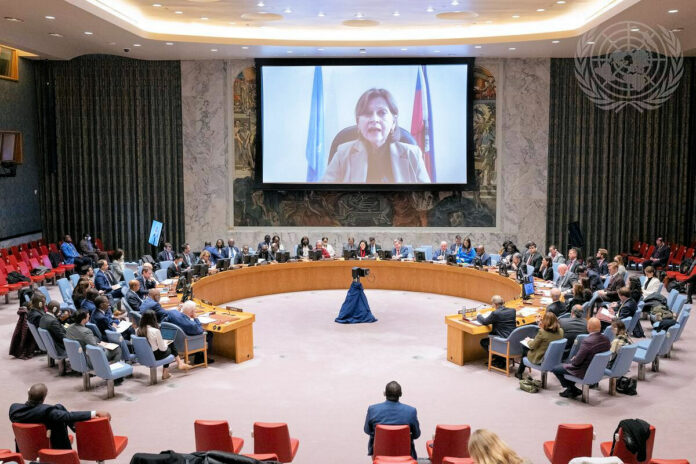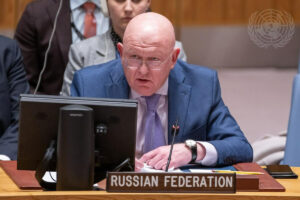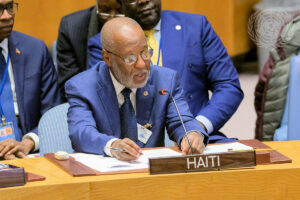
The 15 members of the United Nations Security Council (UNSC), joined by Haiti, Canada, and the Dominican Republic, met to review the situation in Haiti on the afternoon of Dec. 21, 2022. Discussion centered on whether the Council would approve another nation or group of nations to militarily intervene in Haiti, ostensibly to assist the Haitian National Police (PNH) in their fight against armed “gangs.” The need for sanctions and how to apply them was also debated.
The meeting was “far from orthodox,” in the words of one diplomat, primarily due to the frank remarks from one of the three briefers, Haïti Liberté journalist Kim Ives (whose full address is published separately) and the immediate follow-up statement by the Russian ambassador, who slammed the hypocritical conduct of Haiti’s three neo-colonial overlords – the U.S., Canada, and France.
As usual, Helen La Lime, Special Representative of the Secretary-General for Haiti and Head of BINUH (UN Integrated Office in Haiti), spoke first, highlighting what she called “alarmingly high levels of gang violence in the country.” While reporting that the Haitian National Police (PNH) had broken “the siege of Haiti’s main fuel terminal” thereby “creating the semblance of a possible return to normalcy,” any “hope was quickly dispelled,” she claimed, by “a new level of gang activity [which] was immediately felt across the capital, marked by spikes in kidnappings, killings, and rapes.”
“November witnessed 280 intentional homicides; the highest on record,” La Lime reported. “Reported kidnappings in 2022 have so far exceeded 1,200 cases – double the number recorded in 2021.”

She went on to present “the catastrophic economic situation” in these terms: “Close to half the population are food insecure, with some 20,000 people facing famine-like conditions… 34% of schools remain closed.. . Suspected cases [of cholera] have reached 15,000, throughout the country’s 10 Departments.”
After painting this grim picture, La Lime came to her punch-line: The PNH “continues to be under-resourced and insufficiently equipped to address the enormity of the task ahead” and hence needs “enhanced operational security support,” in other words, foreign military boots on Haitian soil.
La Lime was followed by Amb. Michel Xavier Biang of Gabon, speaking in his capacity as Chair of the Security Council’s “Sanctions Committee” established through Resolution 2653 on Oct. 21, 2022. He gave an overview of the Committee’s activities, including the nomination of four candidates for the “Panel of Experts” established by that resolution.
Kim Ives’ statement told the 18 member nations present that they had received “half-truths” in their briefings from La Lime, that the Council’s October sanctions had been “misguided and counter-productive,” and that Haitians, “with the exception of Haiti’s tiny bourgeoisie,” did not want another foreign military intervention.
Russia’s Permanent Representative to the UN, Vassily Nebenzia, began his remarks by thanking Ives for “his rather interesting and unbiased view,” adding that it was “very useful to invite briefers who can provide additional information and… different perspectives.”
Then he took his gloves off. “Look at the situation with unblocking of the oil terminal, which used to be presented almost as a cure-all solution. However, this did not facilitate the population’s access to basic goods and services. Just like a considerable part of Haitians, we do have doubts that the option of deploying an international force would change the situation.
“If we want to come up with truly effective steps, we need to elaborate a comprehensive understanding of the causes of the current situation in Haiti – a chronic crisis of statehood, socio-economic collapse, and decomposition of legal institutions to a large extent are the results of protracted external ‘political engineering.’ The historical responsibility for this rests not only with Washington, which has repeatedly interfered in Haiti’s internal affairs, including by armed force, but also with Paris.
a chronic crisis of statehood, socio-economic collapse, and decomposition of legal institutions are the results of protracted external ‘political engineering.’
“It was colonial France that, for more than 100 years after Haiti’s liberation, received from it the so-called ‘payments for independence,’ extorted through blackmail and a military ultimatum. This was the first and only case in history when those liberated from slavery had to pay off their oppressors. Huge remittances, which today would equal billions of dollars, were transferred to French bankers and landowners instead of serving the development of a young and not-too-rich country.”
Ambassador Nebenzia went on to explain that “former colonial powers have changed their methods, but their colonial approaches have remained the same. Interference in Haiti’s internal affairs occurs by means of imposing foreign solutions and putting in place political figures outside of Haiti’s legal mechanisms. As a result, there are no authorities in Haiti that can be called legitimate, that are established in accordance with the national Constitution. Lasting international involvement in Haitian affairs have instilled in some local elites the feeling of dependency and permissiveness and made them think that their future would be contingent, not on a popular vote, but on the benevolence of external patrons and sponsors,” a clear reference to the various political “Accords” clamoring for Washington’s benediction.
He then criticized the U.S., “which eagerly stigmatizes authorities in some Latin American countries as unconstitutional,” a reference to Venezuela, “while at the same time being very protective of others, whose regimes are loyal to the U.S…. We know what Washington does when it needs to subjugate a country. It utilizes unilateral sanctions against the unwanted political figures to shape the domestic ‘political field’ as the U.S. finds fit. Canada does the same. For example, we are aware that the Canadian sanctions list includes at least two former Haitian Prime Ministers, who intend to contest this decision. We warn against presenting these sanctions as a reaction of the entire international community in the framework of UNSC Sanctions Committee. This Committee was established by a UNSC resolution exactly to avoid unilateral action and elaborate joint solutions, while engaging specialized experts in order to assess the feasibility and adequacy of possible restrictions.”
Ambassador Nebenzia concluded by saying that “the insights of Mr. Ives… should be the reason for us to be even more careful with sanctions. Otherwise, our sanctions risk affecting not the criminal elements, but the opposition activists who could take part in the nationwide dialogue, but somehow turn out to be unwelcome for the U.S. and its satellites. I stress again: unilateral measures by the U.S. and Canada do not represent the will of the international community and must not be something the new Sanctions Committee on Haiti should proceed from.”
Most of the remaining delegation statements began by including a “thanks to Mr. Kim Ives,” but six nations very pointedly did not name him or “take note” of his briefing: the U.S., France, Canada, England, the Dominican Republic, and, of course, Haiti.
On the contrary, Haiti’s Foreign Affairs Minister Jean Victor Généus, bitterly attacked Ives’ account (without naming him) saying: “I find it incredible that here, in this forum, someone can do marketing and promotion for gangs that kill and assassinate… To describe bandits and criminals who kill, rape and abduct as revolutionary leaders or leaders of the opposition simply does not correspond to the reality.” This statement was a response to Ives’ criticism that the Council had sanctioned, not criminal gangs committing abductions, rape, and extortion, but crime-fighting federations like the “Revolutionary Forces of the G9 Family and Allies.”
At the same time, Généus’ remarks made clear the absurdity of some bourgeois opposition spokespeople and pundits, particularly from the “left,” who have argued that the G9 is somehow linked to or supported by the regime of de facto Prime Minister Ariel Henry.
In essence, however, Généus’ statement aimed to ask “the friends of Haiti to provide robust [code for military] assistance to help the national police to put an end to the phenomenon of armed gangs” while claiming that “the vast majority of Haitians is in favor of that kind of assistance.” In short, it was a reiteration of Henry’s Constitution-violating Oct. 7 appeal for foreign military intervention.

In this request, Généus was echoed by Dominican Foreign Minister Roberto Álvarez Gil, with whom he should have more logically been at odds, given the Dominican Republic’s recent brutal treatment of Haitians in that country. Thus Álvarez called for the Security Council to intervene in Haiti “as soon as possible by creating a multinational force in support of the Haitian National Police. This is the only viable way in the short term to rescue the Haitian people from their current situation and bring a much-deserved peace to their region.”
Canada’s UN Ambassador Robert Keith “Bob” Rae, recently returned from a trip to Haiti during which he met with Henry and the bourgeois opposition, also supported Henry’s call for a “multinational force” to assist the Haitian National Police, which Canada is the most active in assembling. He obliquely called Ives’ briefing “nonsense.” Canada is one of the largest funders of the UN’s “Peace Building” fund, which pays for military interventions.
Alternate U.S. Representative for Special Political Affairs to the UN Robert A. Wood spoke on behalf of Washington, supporting also “a non-United Nations multinational security force, as requested by the Haitian Government,” admitting that the U.S. had provided Henry’s regime with “”more than $90 million in security support in the past 18 months.”
In Haiti, most of the mainstream media coverage focused not on the looming threat of foreign invasion (which preoccupies the masses) but on Haïti Liberté’s criticism of the Security Council for targeting Jimmy “Barbecue” Cherizier with its Oct. 21 sanctions rather than criminal gang leaders in Haiti. Cherizier’s G9 federation has never been credibly charged with kidnapping, rape, extortion, or similar crimes carried out by its adversaries in the G-Pèp federation.
Généus’ statement was a reiteration of Ariel Henry’s Constitution-violating Oct. 7 appeal for foreign military intervention.
“Kim Ives Defends Jimmy Barbecue before the UN Security Council” was the headline of Rezo Nodwes’ report on the Dec. 21 meeting.
“He warned against confusing criminal gangs with self-defense committees formed to combat criminality, saying ‘you are lumping together the good guys with the bad guys in one basket called the gangs,” the website reported.
The daily Le Nouvelliste headlined its article on the meeting: “Kim Ives’ Portrait of Jimmy Chérizier Causes Some on the UN Security Council to Bristle.” In the piece, author Roberson Alphonse wrote that “after listing the names of gang leaders including ‘Lamò sanjou,’ ‘Izo,’ and ‘Ti Lapli’ who acknowledge offenses such as kidnappings of American and French citizens and homicides, Mr. Ives termed it ‘ironic’ that the UN did not sanction any of them but instead sanctioned Jimmy ‘Barbecue’ Chérizier, spokesperson for the G-9, which is ‘dedicated to keeping kidnapping, extortion, rape, and other crimes out of their midst.’”
Le Nouvelliste then went on to highlight the acrimonious replies of Généus and Rae.
Generally, except for some fringe zealots, the response on social media was positive. “Several times I have strongly disagreed with Ives’ views, but in this case he made a few points that no Haitian actor right now is willing or allowed to bring up at a UN Security Council meeting,” popular commentator Gedony Fontil wrote on Facebook, saying “Kim Ives’ intervention at the Security Council meeting was an important and necessary step in recalibrating the perceptions that some member states have been misled into… Kim Ives’ presentation to the UN Security Council was a rare opportunity for someone to offer a different perspective on the real reality in Haiti, which might recalibrate the positions of some UN members.”
“Kim Ives delivers key points at UN Security Council” was the title of The 1804 Podcast, a Canada-based Haitian program which offered favorable commentary on the briefing.
In short, the Dec. 21, 2022 Security Council meeting is best summed up by the comments of two diplomats who spoke to Ives immediately after the session. “You were brutal,” said one ambassador with a smile. “The truth is sometimes very hard,” Ives replied.
Another ambassador archly opined: “That certainly wasn’t a typical Security Council meeting.”
Indeed, it is rare that the analysis of people impacted by Security Council decisions are given a chance to express their views before that body and the world.











[…] Debate During and Reactions Following the UN Security Council’s Dec. 21 Meeting on Haiti Haiti Liberte […]
[…] Security Council, together with Haiti, Canada, and the Dominican Republic, held a meeting to discuss the situation in Haiti. During the meeting, the special representative of the UN secretary-general for Haiti and the head […]
[…] Security Council, together with Haiti, Canada, and the Dominican Republic, held a meeting to discuss the situation in Haiti. During the meeting, the special representative of the UN secretary-general for Haiti and the head […]